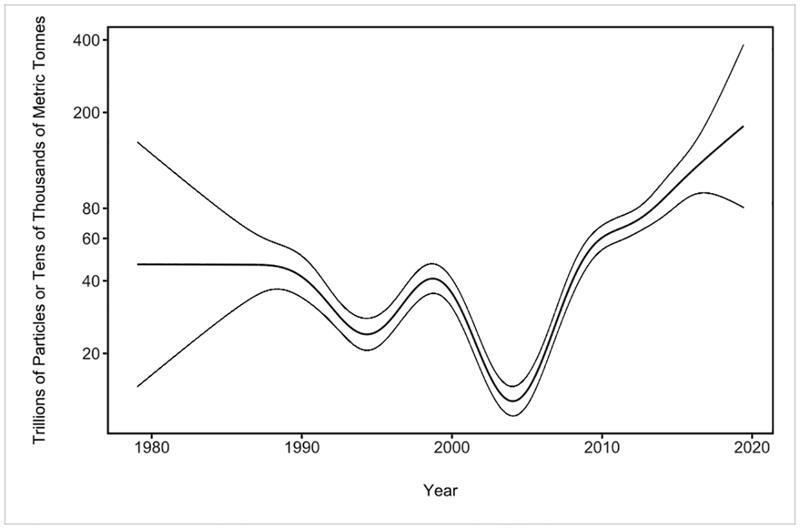
Study estimates over 170 trillion plastic particles afloat in the world's oceans
by Daria Blackwell 21 Nov 2023 16:52 UTC

Global trend from 1979 to 2019 with confidence intervals © Daria Blackwell
That is more than 21,000 pieces of plastic in the oceans for each of the Earth's 8 billion residents.
The study, which was published in the PLOS One journal, draws on nearly 12,000 samples collected across 40 years of research in all the world's major ocean basins. The scientists observed no clear detectable trend until the 1990s, a fluctuating but stagnant trend from then until 2005, and a rapid increase until the present.
The figure shows the change in the abundance of ocean plastic over time in trillions of particles or tens of thousands of metric tonnes using a smoothing spline and a generalized additive model. A central line is the model fit; confidence intervals are 2 times the standard error of the model.
Starting in 2005, researchers observed a major rise in the density of the material, which they say may have coincided with an explosion in plastics production. They called for urgent international policy interventions for the observed acceleration of plastic densities in the world's oceans, also reported for beaches around the world.
The study concludes that the environmental recovery of plastic has limited merit, so solution strategies must address those systems that restrict emissions of plastic pollution in the first place.
Source: A growing plastic smog, now estimated to be over 170 trillion plastic particles afloat in the world's oceans—Urgent solutions required
Marcus Eriksen, Win Cowger, Lisa M. Erdle, Scott Coffin, Patricia Villarrubia-Gómez, Charles J. Moore, Edward J. Carpenter, Robert H. Day, Martin Thiel, Chris Wilcox
Published: March 8, 2023 doi.org/10.1371/journal.pone.0281596
This article has been provided by the courtesy of the Ocean Cruising Club.